Fleurs du Mal Magazine


Or see the index
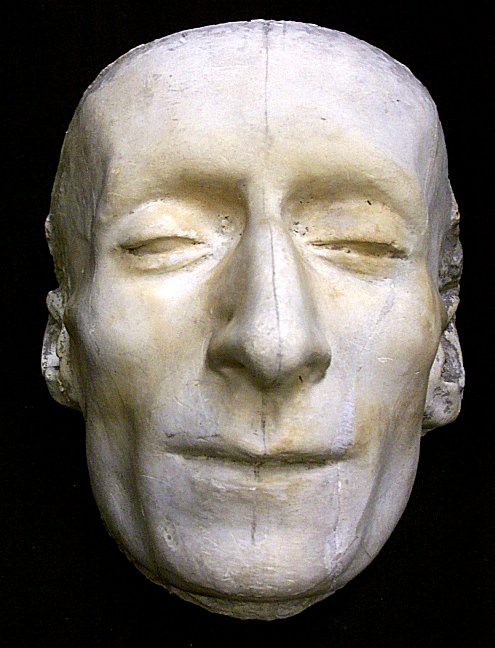
Giacomo Leopardi
(1798-1837)
A Silvia
Silvia, rimembri ancora
Quel tempo della tua vita mortale,
Quando beltà splendea
Negli occhi tuoi ridenti e fuggitivi,
E tu, lieta e pensosa, il limitare
Di gioventù salivi?
Sonavan le quiete
Stanze, e le vie dintorno,
Al tuo perpetuo canto,
Allor che all’opre femminili intenta
Sedevi, assai contenta
Di quel vago avvenir che in mente avevi.
Era il maggio odoroso: e tu solevi
Così menare il giorno.
Io gli studi leggiadri
Talor lasciando e le sudate carte,
Ove il tempo mio primo
E di me si spendea la miglior parte,
D’in su i veroni del paterno ostello
Porgea gli orecchi al suon della tua voce,
Ed alla man veloce
Che percorrea la faticosa tela.
Mirava il ciel sereno,
Le vie dorate e gli orti,
E quinci il mar da lungi, e quindi il monte.
Lingua mortal non dice
Quel ch’io sentiva in seno.
Che pensieri soavi,
Che speranze, che cori, o Silvia mia!
Quale allor ci apparia
La vita umana e il fato!
Quando sovviemmi di cotanta speme,
Un affetto mi preme
Acerbo e sconsolato,
E tornami a doler di mia sventura.
O natura, o natura,
Perchè non rendi poi
Quel che prometti allor? perchè di tanto
Inganni i figli tuoi?
Tu pria che l’erbe inaridisse il verno,
Da chiuso morbo combattuta e vinta,
Perivi, o tenerella. E non vedevi
Il fior degli anni tuoi;
Non ti molceva il core
La dolce lode or delle negre chiome,
Or degli sguardi innamorati e schivi;
Nè teco le compagne ai dì festivi
Ragionavan d’amore.
Anche peria fra poco
La speranza mia dolce: agli anni miei
Anche negaro i fati
La giovanezza. Ahi come,
Come passata sei,
Cara compagna dell’età mia nova,
Mia lacrimata speme!
Questo è quel mondo? questi
I diletti, l’amor, l’opre, gli eventi
Onde cotanto ragionammo insieme?
Questa la sorte dell’umane genti?
All’apparir del vero
Tu, misera, cadesti: e con la mano
La fredda morte ed una tomba ignuda
Mostravi di lontano.
![]()
Giacomo Leopardi poetry
fleursdumal.nl magazine
More in: Archive K-L, Leopardi, Giacomo
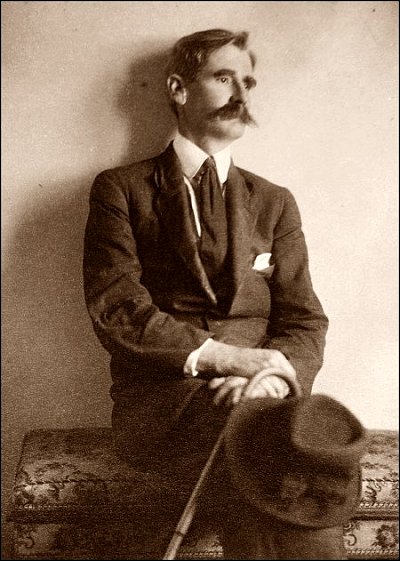
Henry Lawson
(1867-1922)
Knocked Up
I’m lyin’ on the barren ground that’s baked and cracked with drought,
And dunno if my legs or back or heart is most wore out;
I’ve got no spirits left to rise and smooth me achin’ brow —
I’m too knocked up to light a fire and bile the billy now.
Oh it’s trampin’, trampin’, tra-a-mpin’, in flies an’ dust an’ heat,
Or it’s trampin’ trampin’ tra-a-a-mpin’
through mud and slush ‘n sleet;
It’s tramp an’ tramp for tucker — one everlastin’ strife,
An’ wearin’ out yer boots an’ heart in the wastin’ of yer life.
They whine o’ lost an’ wasted lives in idleness and crime —
I’ve wasted mine for twenty years, and grafted all the time
And never drunk the stuff I earned, nor gambled when I shore —
But somehow when yer on the track yer life seems wasted more.
A long dry stretch of thirty miles I’ve tramped this broilin’ day,
All for the off-chance of a job a hundred miles away;
There’s twenty hungry beggars wild for any job this year,
An’ fifty might be at the shed while I am lyin’ here.
The sinews in my legs seem drawn, red-hot — ‘n that’s the truth;
I seem to weigh a ton, and ache like one tremendous tooth;
I’m stung between my shoulder-blades — my blessed back seems broke;
I’m too knocked out to eat a bite — I’m too knocked up to smoke.
The blessed rain is comin’ too — there’s oceans in the sky,
An’ I suppose I must get up and rig the blessed fly;
The heat is bad, the water’s bad, the flies a crimson curse,
The grub is bad, mosquitoes damned — but rheumatism’s worse.
I wonder why poor blokes like me will stick so fast ter breath,
Though Shakespeare says it is the fear of somethin’ after death;
But though Eternity be cursed with God’s almighty curse —
What ever that same somethin’ is I swear it can’t be worse.
For it’s trampin’, trampin’, tra-a-mpin’ thro’ hell across the plain,
And it’s trampin’ trampin’ tra-a-mpin’ thro’ slush ‘n mud ‘n rain —
A livin’ worse than any dog — without a home ‘n wife,
A-wearin’ out yer heart ‘n soul in the wastin’ of yer life.
Henry Lawson poetry
fleursdumal.nl magazine
More in: Archive K-L, Lawson, Henry
.jpg)
Giacomo Leopardi
(1798-1837)
Ultimo canto di Saffo
Placida notte, e verecondo raggio
Della cadente luna; e tu che spunti
Fra la tacita selva in su la rupe,
Nunzio del giorno; oh dilettose e care
Mentre ignote mi fur l’erinni e il fato,
Sembianze agli occhi miei; già non arride
Spettacol molle ai disperati affetti.
Noi l’insueto allor gaudio ravviva
Quando per l’etra liquido si volve
E per li campi trepidanti il flutto
Polveroso de’ Noti, e quando il carro,
Grave carro di Giove a noi sul capo,
Tonando, il tenebroso aere divide.
Noi per le balze e le profonde valli
Natar giova tra’ nembi, e noi la vasta
Fuga de’ greggi sbigottiti, o d’alto
Fiume alla dubbia sponda
Il suono e la vittrice ira dell’onda.
Bello il tuo manto, o divo cielo, e bella
Sei tu, rorida terra. Ahi di cotesta
Infinita beltà parte nessuna
Alla misera Saffo i numi e l’empia
Sorte non fenno. A’ tuoi superbi regni
Vile, o natura, e grave ospite addetta,
E dispregiata amante, alle vezzose
Tue forme il core e le pupille invano
Supplichevole intendo. A me non ride
L’aprico margo, e dall’eterea porta
Il mattutino albor; me non il canto
De’ colorati augelli, e non de’ faggi
Il murmure saluta: e dove all’ombra
Degl’inchinati salici dispiega
Candido rivo il puro seno, al mio
Lubrico piè le flessuose linfe
Disdegnando sottragge,
E preme in fuga l’odorate spiagge.
Qual fallo mai, qual sì nefando eccesso
Macchiommi anzi il natale, onde sì torvo
Il ciel mi fosse e di fortuna il volto?
In che peccai bambina, allor che ignara
Di misfatto è la vita, onde poi scemo
Di giovanezza, e disfiorato, al fuso
Dell’indomita Parca si volvesse
Il ferrigno mio stame? Incaute voci
Spande il tuo labbro: i destinati eventi
Move arcano consiglio. Arcano è tutto,
Fuor che il nostro dolor. Negletta prole
Nascemmo al pianto, e la ragione in grembo
De’ celesti si posa. Oh cure, oh speme
De’ più verd’anni! Alle sembianze il Padre,
Alle amene sembianze eterno regno
Diè nelle genti; e per virili imprese,
Per dotta lira o canto,
Virtù non luce in disadorno ammanto.
Morremo. Il velo indegno a terra sparto,
Rifuggirà l’ignudo animo a Dite,
E il crudo fallo emenderà del cieco
Dispensator de’ casi. E tu cui lungo
Amore indarno, e lunga fede, e vano
D’implacato desio furor mi strinse,
Vivi felice, se felice in terra
Visse nato mortal. Me non asperse
Del soave licor del doglio avaro
Giove, poi che perìr gl’inganni e il sogno
Della mia fanciullezza. Ogni più lieto
Giorno di nostra età primo s’invola.
Sottentra il morbo, e la vecchiezza, e l’ombra
Della gelida morte. Ecco di tante
Sperate palme e dilettosi errori,
Il Tartaro m’avanza; e il prode ingegno
Han la tenaria Diva
E l’atra notte, e la silente riva.
![]()
Giacomo Leopardi poetry
fleursdumal.nl magazine
More in: Archive K-L, Leopardi, Giacomo
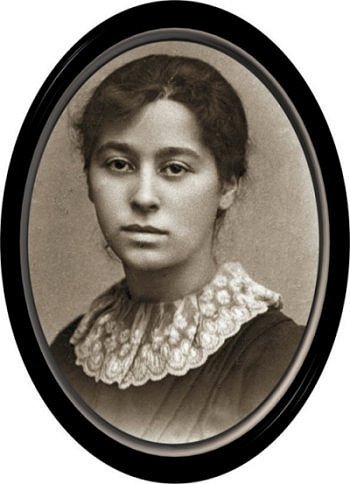
Amy Levy
(1861-1889)
Christopher Found
I
At last; so this is you, my dear!
How should I guess to find you here?
So long, so long, I sought in vain
In many cities, many lands,
With straining eyes and groping hands;
The people marvelled at my pain.
They said: “But sure, the woman’s mad;
What ails her, we should like to know,
That she should be so wan and sad,
And silent through the revels go?”
They clacked with such a sorry stir!
Was I to tell? were they to know
That I had lost you, Christopher?
Will you forgive me for one thing?
Whiles, when a stranger came my way,
My heart would beat and I would say :
” Here’s Christopher!” –then lingering
With longer gaze, would turn away
Cold, sick at heart. My dear, I know
You will forgive me for this thing.
It is so very long ago
Since I have seen your face–till now;
Now that I see it–lip and brow,
Eyes, nostril, chin, alive and clear;
Last time was long ago; I know
This thing you will forgive me, dear.
II
There is no Heaven–This is the best;
O hold me closer to your breast;
Let your face lean upon my face,
That there no longer shall be space
Between our lips, between our eyes.
I feel your bosom’s fall and rise.
O hold me near and yet more near;
Ah sweet ; I wonder do you know
How lone and cold, how sad and drear,
Was I a little while ago;
Sick of the stress, the strife, the stir;
But I have found you, Christopher.
III
If only you had come before!
(This is the thing I most deplore)
A seemlier woman you had found,
More calm, by courtesies more bound,
Less quick to greet you, more subdued
Of appetite; of slower mood.
But ah! you come so late, so late!
This time of day I can’t pretend
With slight, sweet things to satiate
The hunger-cravings. Nay, my friend,
I cannot blush and turn and tremble,
Wax loth as younger maidens do.
Ah, Christopher, with you, with you,
You would not wish me to dissemble?
IV
So long have all the days been meagre,
With empty platter, empty cup,
No meats nor sweets to do me pleasure,
That if I crave–is it over-eager,
The deepest draught, the fullest measure,
The beaker to the brim poured up?
V
Shelley, that sprite from the spheres above,
Says, and would make the matter clear,
That love divided is larger love;–
We’ll leave those things to the bards, my dear.
For you never wrote a verse, you see;
And I–my verse is not fair nor new.
Till the world be dead, you shall love but me,
Till the stars have ceased, I shall love but you.
EPILOGUE
Thus ran the words; or rather, thus did run
Their purport. Idly seeking in the chest
(You see it yonder), I had found them there:
Some blotted sheets of paper in a case,
With a woman’s name writ on it: “Adelaide.”
Twice on the writing there was scored the date
Of ten years back; and where the words had end
Was left a space, a dash, a half-writ word,
As tho’ the writer minded, presently
The matter to pursue.
I questioned her,
That worthy, worthy soul, my châtelaine,
Who, nothing loth, made answer.
There had been
Another lodger ere I had the rooms,
Three months gone by–a woman.
“Young, sir ? No.
Must have seen forty if she’d seen a day!
A lonesome woman; hadn’t many friends;
Wrote books, I think, and things for newspapers.
Short in her temper–eyes would flash and flame
At times, till I was frightened. Paid her rent
Most regular, like a lady.
Ten years back,
They say (at least Ann Brown says), ten years back
The lady had a lover. Even then
She must have been no chicken.
Three months since
She died. Well, well, the Lord is kind and just.
I did my best to tend her, yet indeed
It’s bad for trade to have a lodger die.
Her brother came, a week before she died:
Buried her, took her things, threw in the fire
The littered heaps of paper.
Yes, the sheets,
They must have been forgotten in the chest;–
I never knew her name was Adelaide.”
Amy Levy poetry
fleursdumal.nl magazine
More in: Amy Levy, Archive K-L, Levy, Amy
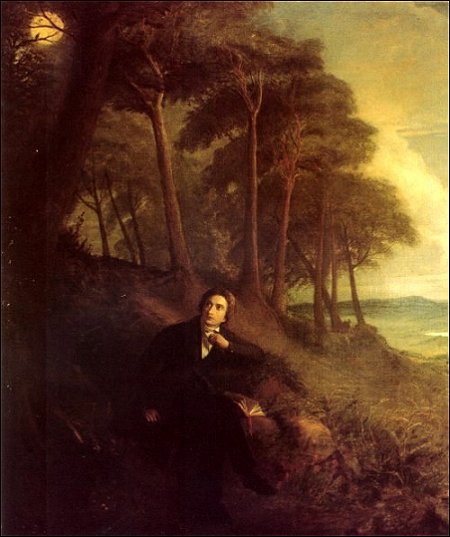
John Keats
(1795–1821)
Ode to a nightingale
My heart aches, and a drowsy numbness pains
My sense, as though of hemlock I had drunk,
Or emptied some dull opiate to the drains
One minute past, and Lethe-wards had sunk:
‘Tis not through envy of thy happy lot,
But being too happy in thine happiness,–
That thou, light-winged Dryad of the trees,
In some melodious plot
Of beechen green, and shadows numberless,
Singest of summer in full-throated ease.
O, for a draught of vintage! that hath been
Cool’d a long age in the deep-delved earth,
Tasting of Flora and the country green,
Dance, and Provençal song, and sunburnt mirth!
O for a beaker full of the warm South,
Full of the true, the blushful Hippocrene,
With beaded bubbles winking at the brim,
And purple-stained mouth;
That I might drink, and leave the world unseen,
And with thee fade away into the forest dim:
Fade far away, dissolve, and quite forget
What thou among the leaves hast never known,
The weariness, the fever, and the fret
Here, where men sit and hear each other groan;
Where palsy shakes a few, sad, last gray hairs,
Where youth grows pale, and spectre-thin, and dies;
Where but to think is to be full of sorrow
And leaden-eyed despairs,
Where Beauty cannot keep her lustrous eyes,
Or new Love pine at them beyond to-morrow.
Away! away! for I will fly to thee,
Not charioted by Bacchus and his pards,
But on the viewless wings of Poesy,
Though the dull brain perplexes and retards:
Already with thee! tender is the night,
And haply the Queen-Moon is on her throne,
Cluster’d around by all her starry Fays;
But here there is no light,
Save what from heaven is with the breezes blown
Through verdurous glooms and winding mossy ways.
I cannot see what flowers are at my feet,
Nor what soft incense hangs upon the boughs,
But, in embalmed darkness, guess each sweet
Wherewith the seasonable month endows
The grass, the thicket, and the fruit-tree wild;
White hawthorn, and the pastoral eglantine;
Fast fading violets cover’d up in leaves;
And mid-May’s eldest child,
The coming musk-rose, full of dewy wine,
The murmurous haunt of flies on summer eves.
Darkling I listen; and, for many a time
I have been half in love with easeful Death,
Call’d him soft names in many a mused rhyme,
To take into the air my quiet breath;
Now more than ever seems it rich to die,
To cease upon the midnight with no pain,
While thou art pouring forth thy soul abroad
In such an ecstasy!
Still wouldst thou sing, and I have ears in vain–
To thy high requiem become a sod.
Thou wast not born for death, immortal Bird!
No hungry generations tread thee down;
The voice I hear this passing night was heard
In ancient days by emperor and clown:
Perhaps the self-same song that found a path
Through the sad heart of Ruth, when, sick for home,
She stood in tears amid the alien corn;
The same that oft-times hath
Charm’d magic casements, opening on the foam
Of perilous seas, in faery lands forlorn.
Forlorn! the very word is like a bell
To toll me back from thee to my sole self!
Adieu! the fancy cannot cheat so well
As she is fam’d to do, deceiving elf.
Adieu! adieu! thy plaintive anthem fades
Past the near meadows, over the still stream,
Up the hill-side; and now ’tis buried deep
In the next valley-glades:
Was it a vision, or a waking dream?
Fled is that music:–Do I wake or sleep?
Ode aan een nachtegaal
Hartzeer en lome sufheid plaagt mijn geest,
Alsof ‘k een kerveldrank mij had bereid,
Of juist aan duffe opium was geweest
En was verzonken in vergetelheid:
‘t Komt niet door afgunst op jouw gunstig lot
Maar door te grote vreugd om jouw geluk, –
Dat jij, die vederlichte nimf van ‘t woud,
Vol melodiegenot
In ‘t schaduwrijke groen, zo druk
En zoetgevooisd een zomerzangfeest houdt.
O, gun mij een goede wijn! gekoeld bewaard
Diep in de grond, in jaren niet verzet,
Smakend naar Flora en de groene gaard,
Dans, Provençaalse zang, en zonnepret!
O, dat vol zuiderwarmte een glas hier stond,
Vol blozende en ware Hippocreen,
Met luchtbelkraaltjes glinsterend aan de rand,
En paars-gevlekte mond;
Dat ik mij laafde en uit het zicht verdween,
Met jou vervaagd in ‘t schimmig bomenland:
Vervaagd naar ver, versmolten, en gans kwijt
Wat tussen ‘t groen jij nooit hebt opgemerkt:
De sleur, de onrust en de narigheid
Alhier, waar men elkaars gekreun verwerkt;
Waar ziekte ‘t laatste, arm, grijs haar aantast,
Waar – ‘n bleke, magere schim – de jongen sterft;
Waar ‘t denken zelf al leidt tot diepe zorgen
En wanhoop’s loden last,
Waar ‘t oog van Schoonheid snel haar schittering derft,
Of nieuwe Liefd’ haar niet begeert na morgen.
Naar ver! naar ver! want ‘k volg jouw melodie,
Niet weggekard door Bacchus’ luipaard-span,
Maar op de blinde wiek der Poëzie,
Hoewel het trage brein dwarsliggen kan:
Teer is de nacht, bij jou daar in ‘t verschiet!
En ook, door al haar sterren-feeën omringd,
Zit op haar vorstentroon tevree de Maan;
Licht is híer echter niet,
Behalve wat uit hemelbriezen blinkt
Op somber groen en ‘t mos der slingerlaan.
Ik heb geen zicht op bloemen aan mijn voet,
Of welke wierook aan de takken hangt,
Maar raad in ‘t donker elk welriekend zoet
Dat bosje, vruchtboom wild, en gras ontvangt,
Geschonken door het passend jaargetij;
Rustieke egelantier en haagdoorn wit;
Viooltjes, snel verwelkt, door blad omhuld;
En ‘t oudste kind van Mei,
De muskusroos, waar nevelwijn in zit,
Op ‘n zomernacht met vlieggezoem gevuld.
In ‘t duister luister ik; en ik heb vaak
De Dood, die kalm maakt, half verliefd gekust,
Liefkoosde hem ook vaak met dichtersspraak,
Om lucht te geven aan mijn ademrust;
Nu meer dan ooit schijnt mij het sterven rijk,
Een middennachtelijk einde, vrij van pijn,
Terwijl jouw ziel zich uitstort uit ‘t gewas
En hoe hartstochtelijk!
Dan zong jij door: mijn oor zou nietig zijn –
En bij jouw requiem was ik wat gras.
Eeuwige Vogel! boreling vrij van dood;
Geen hongerbende ondermijnt jouw lot;
De stem die mij dit nachtuur heeft genood
Hoorde vanouds de keizer en de zot:
Misschien dezelfde zang die toegang vond
Tot ‘t droeve hart van Ruth, van heimwee ziek,
In tranen tussen ‘t vreemde koren staand;
Dezelfde die ‘t bestond
Vensters te openen, magisch met muziek,
Naar zeeschuim wild, in ‘n eens betoverd land.
Betoverd! juist het woord dat als een klok
Van jou mij terugluidt enkel naar mijzelf!
Vaarwel! De illusie mist de toverstok
Vaak toegedicht aan die misleidende elf.
Vaarwel! vaarwel! Jouw klaaglied vlucht ook al
Langs weiden hier, over de stille stroom,
De heuvel op, heeft nu een duik gemaakt
Diep in het volgend dal:
Was het een visioen, of wakkere droom?
Weg is het lied: – Slaap ik of ben ‘k ontwaakt?
Vertaling: Cornelis W. Schoneveld
Uit: Bestorm mijn hart, de beste Engelse gedichten uit de 16e-19e eeuw gekozen en vertaald door Cornelis W. Schoneveld, tweetalige editie. Rainbow Essentials no. 55, Uitgeverij Maarten Muntinga, Amsterdam, 2008, 296 pp, € 9,95 ISBN: 9789041740588
Bestorm mijn hart bevat een dwarsdoorsnede van vier eeuwen lyrische Engelse dichtkunst. Dichters uit de zestiende tot en met de negentiende eeuw dichter onder andere over liefde, natuur, dood en religie. Niet alleen de Nederlandse vertaling is in deze bundel te vinden, maar ook de originele Engelse versie. Deze prachtige bloemlezing, met gedichten van onder anderen Shakespeare, Milton, Pope en Wordsworth, is samengesteld en vertaald door Cornelis W. Schoneveld. Hij is vele jaren docent historische Engelse letterkunde en vertaalwetenschapper aan de Universiteit van Leiden geweest.
fleursdumal.nl magazine
More in: Archive K-L, John Keats, Keats, Keats, John
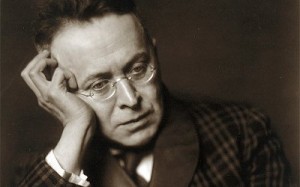
Karl Kraus
(1874-1936)
Dichterschule
Was sind denn das für ausgelassne Knaben,
die in der Form ein Nichtgenügend haben?
Sie machen heute sichs wie ehedem
in Fleiß und Sitten immerzu bequem,
die nur im Fortgang von der Schule glänzen.
Und froh, daß sie die Syntax nicht beherrschen,
so wetzen sie auf ungegerbten Ärschen
und lassen hier und dort das Komma aus.
Dann aber tragen sie ein Nichts nachhaus,
das sie zuhaus zu einem Dreck ergänzen.
Heißt man zur Strafe sie dada zu bleiben,
und ihren Aufsatz zweimal abzuschreiben,
und besten Falles fällt es ihnen ein,
daß sie ihn noch beklecksen und betrenzen.
Kein Substantiv steht mehr an seinem Platze,
der Hauptsatz wird zu einem Nebensatze,
der Nebensatz ist nur ein Adjektiv.
Die ganze Gottesschöpfung lacht sich schief,
wenn solch ein grüner Lümmel singt von Lenzen.
Hier wirkt Natur in andern Dimensionen,
in solchem Wirrsal wollt’ kein Teufel wohnen,
nichts was sie greifen, wächst zur Wortgestalt.
Allein ihr Ethos freilich ist geballt
und sehr dynamisch sind die Impotenzen.
Ein Rattenschwanz im gegenseitigen Loben,
wenn sie in allezu freien Rhythmen toben;
mit uns geht alles bei dem Treiben rund!
Doch schließen sie zumeist den Vers mit Und.
Und dennoch geht es über alle Grenzen.
Sehr mir die Rotte von den letzten Bänken,
sie wollen nur den Oberlehrer kränken,
der schwergeprügelt in solcher Klasse sitzt.
Was sie nicht konnten, haben sie verschwitz.
O laßt uns diese Dichterschule schwänzen!
1920
Karl Kraus poetry
fleursdumal.nl magazine
More in: Archive K-L, Kraus, Karl
.jpg)
Amy Levy
(1861-1889)
To Vernon Lee
On Bellosguardo, when the year was young,
We wandered, seeking for the daffodil
And dark anemone, whose purples fill
The peasant’s plot, between the corn-shoots sprung.
Over the grey, low wall the olive flung
Her deeper greyness ; far off, hill on hill
Sloped to the sky, which, pearly-pale and still,
Above the large and luminous landscape hung.
A snowy blackthorn flowered beyond my reach;
You broke a branch and gave it to me there;
I found for you a scarlet blossom rare.
Thereby ran on of Art and Life our speech;
And of the gifts the gods had given to each–
Hope unto you, and unto me Despair
Amy Levy poetry
fleursdumal.nl magazine
More in: Amy Levy, Archive K-L, Levy, Amy
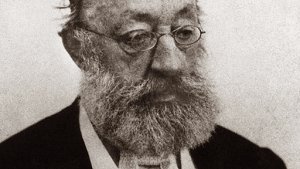
Gottfried Keller
(1819–1890)
Abend auf Golgatha
Eben die dornige Krone geneiget, verschied der Erlöser,
Weißlich in dämmernder Luft glänzte die Schulter des Herrn?
Siehe, da schwebte, vom tauigen Schimmer gelockt, die Phaläne
Flatternd hernieder zu ruhn dort, wo gelastet das Kreuz.
Langsam schlug sie ein Weilchen die samtenen Flügel zusammen,
Breitet’ sie aus und entschwand fern in die sinkende Nacht.
Nicht ganz blieb verlassen ihr Schöpfer: den Pfeiler des Kreuzes
Hielt umfangen das Weib, das er zur Mutter sich schuf.
Gottfried Keller poetry
fleursdumal.nl magazine
More in: Archive K-L, Keller, Gottfried
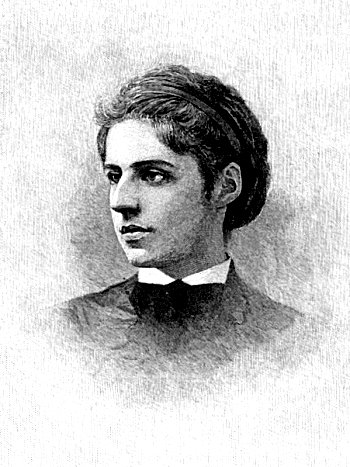
Emma Lazarus
(1849–1887)
Dreams
A dream of lilies: all the blooming earth,
A garden full of fairies and of flowers;
Its only music the glad cry of mirth,
While the warm sun weaves golden-tissued hours;
Hope a bright angel, beautiful and true
As Truth herself, and life a lovely toy,
Which ne’er will weary us, ne’er break, a new
Eternal source of pleasure and of joy.
A dream of roses: vision of Loves tree,
Of beauty and of madness, and as bright
As naught on earth save only dreams can be,
Made fair and odorous with flower and light;
A dream that Love is strong to outlast Time,
That hearts are stronger than forgetfulness,
The slippery sand than changeful waves that climb,
The wind-blown foam than mighty waters’ stress.
A dream of laurels: after much is gone,
Much buried, much lamented, much forgot,
With what remains to do and what is done,
With what yet is, and what, alas! is not,
Man dreams a dream of laurel and of bays,
A dream of crowns and guerdons and rewards,
Wherein sounds sweet the hollow voice of praise,
And bright appears the wreath that it awards.
A dream of poppies, sad and true as Truth,—
That all these dreams were dreams of vanity;
And full of bitter penitence and ruth,
In his last dream, man deems ’twere good to die;
And weeping o’er the visions vain of yore,
In the sad vigils he doth nightly keep,
He dreams it may be good to dream no more,
And life has nothing like Death’s dreamless sleep.
Emma Lazarus poetry
fleursdumal.nl magazine
More in: - Archive Tombeau de la jeunesse, Archive K-L, Lazarus, Emma
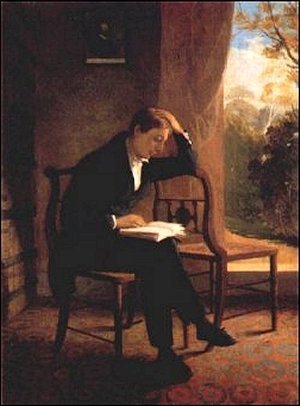
John Keats
(1795 – 1821)
To some ladies
What though while the wonders of nature exploring,
I cannot your light, mazy footsteps attend;
Nor listen to accents, that almost adoring,
Bless Cynthia’s face, the enthusiast’s friend:
Yet over the steep, whence the mountain stream rushes,
With you, kindest friends, in idea I rove;
Mark the clear tumbling crystal, its passionate gushes,
Its spray that the wild flower kindly bedews.
Why linger you so, the wild labyrinth strolling?
Why breathless, unable your bliss to declare?
Ah! you list to the nightingale’s tender condoling,
Responsive to sylphs, in the moon beamy air.
‘Tis morn, and the flowers with dew are yet drooping,
I see you are treading the verge of the sea:
And now! ah, I see it–you just now are stooping
To pick up the keep-sake intended for me.
If a cherub, on pinions of silver descending,
Had brought me a gem from the fret-work of heaven;
And smiles, with his star-cheering voice sweetly blending,
The blessings of Tighe had melodiously given;
It had not created a warmer emotion
Than the present, fair nymphs, I was blest with from you,
Than the shell, from the bright golden sands of the ocean
Which the emerald waves at your feet gladly threw.
For, indeed, ’tis a sweet and peculiar pleasure,
(And blissful is he who such happiness finds,)
To possess but a span of the hour of leisure,
In elegant, pure, and aerial minds.
john keats poetry
fleursdumal.nl poetry magazine
More in: Archive K-L, John Keats, Keats, John
Karl Kraus
(1874-1936)
Der sterbende Soldat
Hauptmann, hol her das Standgericht!
Ich sterb’ für keinen Kaiser nicht!
Hauptmann, du bist des Kaisers Wicht!
Bin tot ich, salutier’ ich nicht!
Wenn ich bei meinem Herren wohn’,
ist unter mir des Kaisers Thron,
und hab’ für sein Geheiß nur Hohn!
Wo ist mein Dorf? Dort spielt mein Sohn.
Wenn ich in meinem Herrn entschlief,
kommt an mein letzter Feldpostbrief.
Es rief, es rief, es rief, es rief!
Oh, wie ist meine Liebe tief!
Hauptmann, du bist nicht bei Verstand,
daß du mich hast hierher gesandt.
Im Feuer ist mein Herz verbrannt.
Ich sterbe für kein Vaterland!
Ihr zwingt mich nicht, ihr zwingt mich nicht!
Seht, wie der Tod die Fessel bricht!
So stellt den Tod vors Standgericht!
Ich sterb’, doch für den Kaiser nicht.
Karl Kraus poetry
fleursdumal.nl magazine
More in: Archive K-L, Kraus, Karl
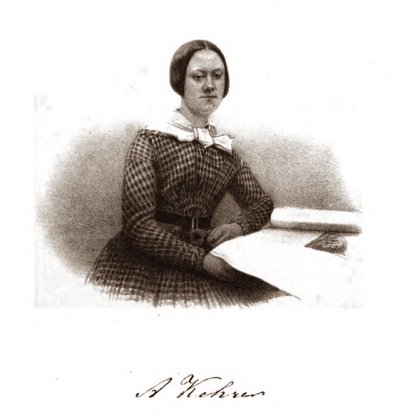
Albertine Kehrer
(1826-1852)
Verwachting
Neen ‘t is geen ondank, geen miskennen uwer gaven,
Gij weet het, die de harten kent!
Als zich mijn zoekend oog naar de overzij der graven
Met onbepaald verlangen wendt.
Ik neem ze dankend aan uw duizend zegeningen,
‘t Gebloemte ontluikend voor mijn voet;
Met duizend stemmen wilde ik van uw liefde zingen
En juichen: o de Heer is goed!
Maar toch terwijl voor mij de wijn der vreugde perelt,
Mijn beker vullend tot den rand,
Keert hopend zich mijn oog naar ‘t heil der hoogre wereld,
De zoetheên van mijn vaderland!
Naar ‘t oord waar ‘t eeuwig schoon zijn vormen zal onthullen
In altijd nieuwe jeugd en pracht,
Waar nooit gedroomd genot de harten zal vervullen
En de eeuwig groene lente lacht.
Waar ‘t onkruid: haat en twist – zal sterven en verleppen
Bij ‘t gloeijend licht der Liefdezon,
En elks geheiligd hart gestâag op nieuw zal scheppen
Uit de allerhoogste Liefdebron!
Waar in ‘t vernieuwd gemoed geen zonde meer zal wonen
Geen zondestrijd, geen zondesmart,
En God in zijn genâ zal tot verwinnaar kroonen,
Die tot den einde heeft volhard.
Waar ik den Heer zal zien, in wien mijn ziel geloofde,
Het Lam, voor ons op aard geslagt;
Den Vorst des Levens, die den dood zijn prikkel roofde
En licht schiep uit der graven nacht!
Waar ik ‘t harmonisch lied te zijner eer hoor klinken
Der duizenden, door Hem gered,
En overstelpt van vreugd, mag aan zijn knieën zinken,
Meêstemmend in hun dankgebed!
O voor ik uit mijn borst dat stil verlangen weere
De heimweezucht, zoo zoet, zoo rein,
Moet eerst uw heilbeloft’ min heerlijk, o mijn Heere!
Min zeker haar vervulling zijn!
Albertine Kehrer poetry
fleursdumal.nl magazine
More in: Albertine Kehrer, Archive K-L, Kehrer, Albertine
Thank you for reading Fleurs du Mal - magazine for art & literature